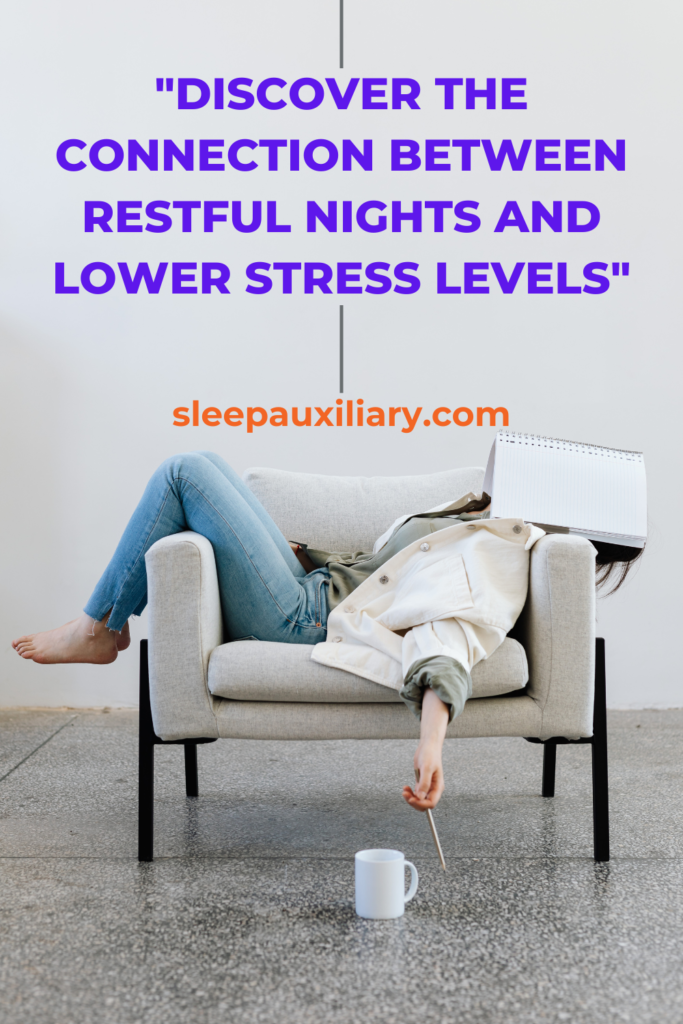Can sleep reduce stress? This intriguing question underscores a fundamental connection between our nightly rest and our daily well-being. In our fast-paced, stress-laden lives, understanding how sleep can serve as a natural antidote to stress is more crucial than ever. While most people recognize that lack of sleep can leave them feeling irritable and overwhelmed, fewer are aware of the profound impact that quality sleep can have on reducing stress levels.
This article delves into the often-overlooked relationship between sleep and stress, exploring how a good night’s rest can help mitigate the adverse effects of stress on both mind and body. By shedding light on this critical connection, we aim to offer valuable insights and practical tips for those seeking natural, effective ways to enhance their sleep quality and overall well-being. Whether you struggle with chronic stress or are simply looking to improve your sleep hygiene, this guide will provide you with the knowledge and tools to harness the power of sleep in reducing stress and promoting a healthier, more balanced life.
Table of Contents
Understanding Stress and Its Impact on Health

What is Stress?
Stress is the body’s natural response to perceived threats or challenges, activating the “fight or flight” response. This physiological reaction involves the release of stress hormones like cortisol and adrenaline, which prepare the body to respond to immediate danger. However, in today’s world, stress is often triggered by non-life-threatening events such as work pressures, financial worries, and personal relationships. This chronic activation of the stress response can have detrimental effects on our health.
Causes of Stress
Modern life is rife with stressors that can disrupt our mental and physical equilibrium. Common sources of stress include demanding job responsibilities, financial instability, and complex personal relationships. Additionally, environmental factors like noise pollution, social media overload, and even poor diet can contribute to heightened stress levels. Unlike acute stress, which can be motivating and beneficial in small doses, chronic stress persists over time and can lead to serious health issues.
Health Consequences of Chronic Stress
Chronic stress can wreak havoc on the body, leading to a wide array of health problems. Prolonged exposure to stress hormones can suppress the immune system, making us more susceptible to illnesses and infections. Cardiovascular issues, such as hypertension and heart disease, are also linked to chronic stress. Furthermore, stress can negatively impact mental health, contributing to conditions like anxiety, depression, and burnout. One often overlooked consequence of chronic stress is its effect on sleep quality, creating a vicious cycle where poor sleep exacerbates stress, which in turn further disrupts sleep.
Understanding the multifaceted nature of stress and its profound impact on health is the first step toward managing it effectively. By recognizing the signs and sources of stress, we can better address its root causes and mitigate its adverse effects on our well-being.
The Link Between Sleep and Stress Reduction

The question “Can sleep reduce stress?” is not just rhetorical; it’s backed by science. Quality sleep plays a crucial role in mitigating stress and promoting overall well-being. Understanding the intricate link between sleep and stress reduction can empower us to make healthier choices for our bodies and minds.
How Sleep Reduces Stress Hormones
During sleep, the body undergoes essential processes that help manage stress hormones. Specifically, cortisol, a primary stress hormone, follows a circadian rhythm, peaking in the early morning and decreasing throughout the day. Adequate sleep helps regulate this cycle, ensuring that cortisol levels remain balanced. Insufficient sleep disrupts this rhythm, leading to elevated cortisol levels, which can increase feelings of stress and anxiety. By maintaining a regular sleep schedule, we can help our bodies keep cortisol in check, reducing overall stress.
Sleep’s Role in Emotional Regulation
Sleep is vital for emotional processing and regulation. During REM (rapid eye movement) sleep, the brain processes emotional experiences, helping to reduce their emotional charge. This function is crucial for maintaining emotional stability and reducing anxiety. When sleep is compromised, the brain’s ability to manage emotions diminishes, leading to heightened stress and emotional reactivity. Thus, getting enough REM sleep is essential for maintaining mental health and reducing stress.
Studies Linking Sleep to Lower Stress Levels
Numerous studies highlight the profound impact of sleep on stress levels. For instance, a Banner Health article discusses how sleep can significantly reduce stress by lowering cholesterol levels, improving immune function, and enhancing emotional processing. The article emphasizes that adequate sleep supports hormone balance, bolsters the immune system, and boosts mood, all of which contribute to lower stress levels.
Research also indicates that sleep deprivation can lead to increased anxiety and impaired cognitive function, further exacerbating stress. Conversely, consistent, quality sleep promotes resilience against stressors, improving overall mental health.
By understanding and leveraging the link between sleep and stress reduction, we can adopt healthier sleep habits to enhance our well-being. Simple practices such as maintaining a consistent sleep schedule, creating a comfortable sleep environment, and incorporating relaxation techniques can make a significant difference in our stress levels and quality of life.
Tips for Improving Sleep to Combat Stress
Quality sleep is a powerful tool in combating stress. By optimizing your sleep habits, you can significantly reduce stress levels and enhance your overall well-being. Here are some effective strategies to improve your sleep:
Establishing a Sleep Routine

Creating a consistent sleep schedule helps regulate your body’s internal clock, making it easier to fall asleep and wake up naturally. Aim to go to bed and wake up at the same time every day, even on weekends. This consistency reinforces your sleep-wake cycle, leading to better sleep quality and reduced stress.
Optimizing Your Sleep Environment
Your sleep environment plays a crucial role in the quality of your rest. Consider the following tips to create a sleep-friendly space:
- Comfortable Mattress and Pillows: Invest in a mattress and pillows that provide adequate support and comfort.
- Temperature Control: Keep your bedroom cool, ideally between 60-67°F (15-19°C), to promote better sleep.
- Darkness: Use blackout curtains or an eye mask to block out light, which can interfere with your sleep cycle.
- Noise Reduction: Use earplugs or a white noise machine to minimize disruptive sounds.
Relaxation Techniques for Better Sleep
Incorporating relaxation techniques into your nightly routine can help you unwind and prepare for sleep. These methods can reduce stress and promote a calm state of mind:
- Meditation: Practice mindfulness or guided meditation to clear your mind and relax your body.
- Deep Breathing Exercises: Engage in deep breathing exercises to reduce tension and slow your heart rate.
- Aromatherapy: Use calming scents like lavender or chamomile to create a relaxing atmosphere.
Additional Tips for Better Sleep

Here are some extra tips to enhance your sleep quality and reduce stress:
- Limit Screen Time: Avoid screens (phones, tablets, TVs) at least an hour before bed, as blue light can interfere with melatonin production.
- Stay Active: Regular physical activity can help you fall asleep faster and enjoy deeper sleep.
- Watch Your Diet: Avoid large meals, caffeine, and alcohol close to bedtime, as they can disrupt sleep.
By implementing these tips, you can create a conducive sleep environment and establish healthy habits that will not only improve your sleep but also significantly reduce your stress levels. Prioritizing good sleep hygiene is a simple yet effective way to enhance your overall well-being and resilience to stress.
Natural Sleep Aids and Supplements
For those struggling with stress-induced sleep disturbances, natural sleep aids and supplements can offer a gentle yet effective solution. Here are some lesser-known options that can help you achieve a restful night’s sleep and reduce stress:
Herbal Remedies

Nature provides a variety of herbs known for their calming and sleep-inducing properties. Unlike synthetic medications, these remedies offer a natural approach to improving sleep quality:
- Valerian Root: Known for its sedative effects, valerian root can help reduce the time it takes to fall asleep and improve sleep quality.
- Passionflower: This herb is often used to alleviate anxiety and insomnia, promoting a sense of calm that can ease you into sleep.
- Ashwagandha: Traditionally used in Ayurvedic medicine, ashwagandha helps manage stress and supports restful sleep by reducing cortisol levels.
Dietary Supplements
Certain dietary supplements can support your body’s natural sleep processes, providing the nutrients needed for optimal sleep:
- Magnesium: This essential mineral plays a role in over 300 biochemical reactions in the body, including those that regulate sleep. Magnesium can help relax muscles and improve sleep quality.
- Melatonin: A hormone naturally produced by the body, melatonin regulates the sleep-wake cycle. Supplemental melatonin can be particularly helpful for those with irregular sleep patterns.
- L-Theanine: Found in green tea, this amino acid promotes relaxation and reduces stress without causing drowsiness, making it easier to fall asleep.
Lifestyle Changes for Better Sleep

In addition to herbal remedies and supplements, making certain lifestyle changes can enhance sleep quality:
- Balanced Diet: Ensure your diet includes sleep-promoting foods like almonds, turkey, and kiwi.
- Regular Exercise: Incorporate moderate exercise into your daily routine to help regulate your sleep cycle.
- Hydration: Stay hydrated, but avoid excessive liquids before bedtime to minimize nighttime awakenings.
By exploring these natural sleep aids and supplements, you can find a safe and effective way to improve your sleep, reduce stress, and enhance your overall well-being.
Conclusion
Understanding the critical link between sleep and stress is vital for enhancing overall well-being. Quality sleep serves as a natural antidote to stress, helping to regulate stress hormones, improve emotional regulation, and bolster mental health. As highlighted in a Banner Health article, “adequate sleep helps balance hormone levels, supports the immune system, and boosts mood, which can significantly reduce stress and anxiety.”
By implementing effective sleep strategies, such as maintaining a consistent sleep schedule, optimizing your sleep environment, and incorporating relaxation techniques, you can improve your sleep quality and reduce stress levels. Additionally, exploring natural sleep aids and supplements, like valerian root, magnesium, and melatonin, can further support your journey to better sleep and lower stress.

Summary of Key Points
- Understanding Stress: Recognize the physiological and psychological effects of stress and its impact on health.
- Link Between Sleep and Stress Reduction: Discover how sleep regulates stress hormones and enhances emotional stability.
- Tips for Improving Sleep: Implement practical strategies to create a conducive sleep environment and establish healthy sleep habits.
- Natural Sleep Aids: Explore herbal remedies and supplements that support sleep quality and reduce stress.
Prioritizing good sleep hygiene is a simple yet powerful way to manage stress and promote a healthier, more balanced life. By embracing these practices, you can harness the full benefits of sleep to enhance your well-being and resilience to stress.





